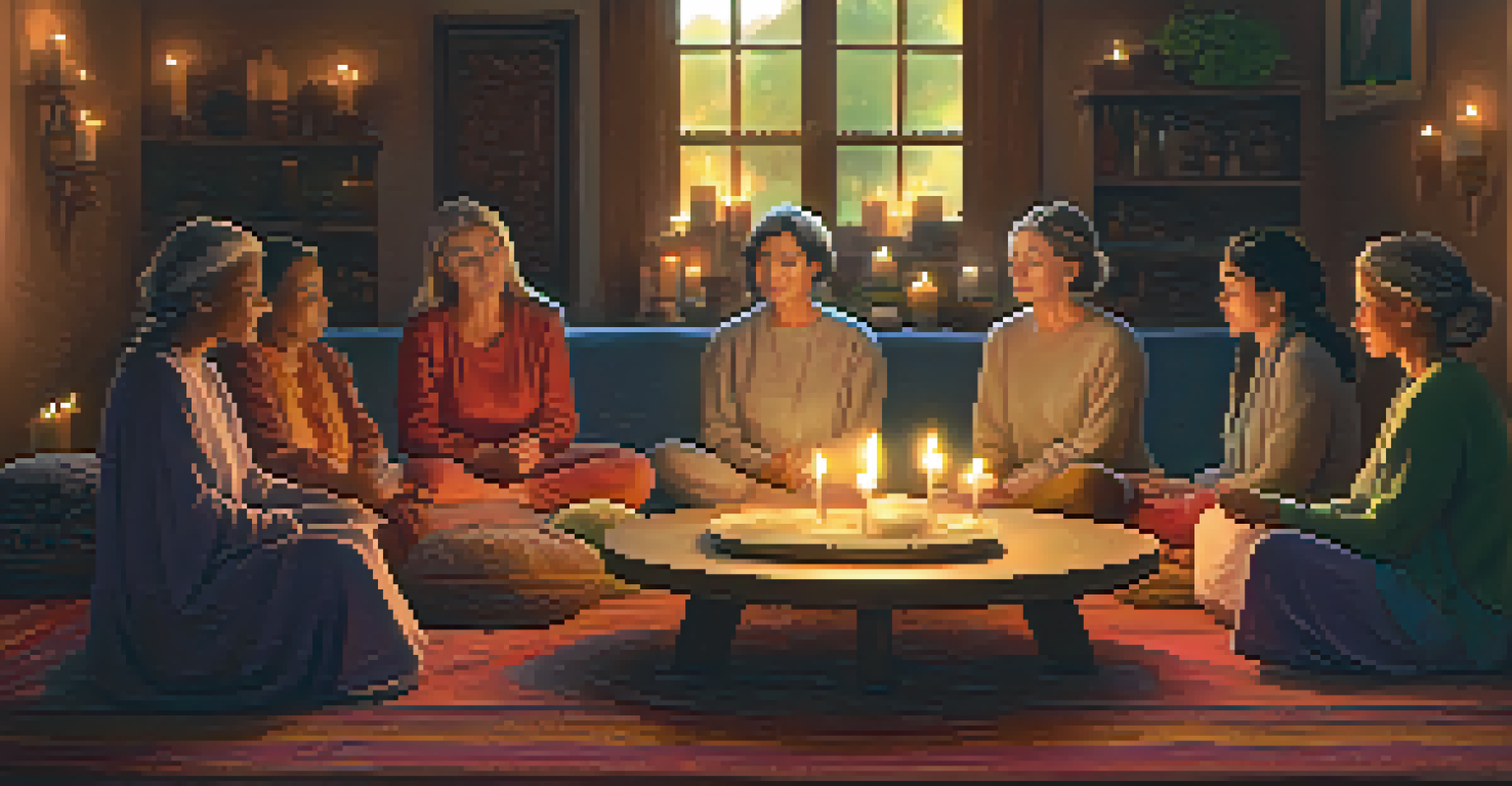How Gender Influences Personal Spiritual Journeys

Understanding Gender and Spirituality
Gender plays a crucial role in shaping our spiritual beliefs and practices. It influences how we perceive the divine and our relationship with spirituality. For instance, many women find empowerment in spirituality through nurturing practices, while men might connect through strength and leadership roles.
Gender is not something that you are, but something that you do. It is not a fixed identity, but a series of performances that shape our experience of the world.
Cultural backgrounds also affect this interplay between gender and spirituality. Different societies have unique beliefs about masculinity and femininity, which reflect in their spiritual traditions. These societal norms can shape an individual's spiritual journey, guiding them toward specific practices or communities.
Ultimately, understanding how gender influences spirituality can lead to a more inclusive approach. It opens the door for diverse expressions of faith, allowing individuals to explore their spirituality in ways that resonate with their gender identity.
Traditional Gender Roles in Spiritual Practices
Many spiritual traditions have historically assigned specific roles based on gender. For example, in some faiths, men may be seen as leaders, while women often take on supportive roles. This division can create barriers for individuals seeking to express their spirituality fully.

However, these traditional roles are evolving. More women are stepping into leadership positions within spiritual communities, challenging long-held views. This shift not only enriches these communities but also encourages men to explore vulnerability and emotional expression in their spiritual journeys.
Gender Shapes Spiritual Beliefs
Gender influences how individuals perceive the divine and engage with spirituality, leading to varied expressions of faith.
As these roles continue to blur, individuals are finding new pathways to connect with their spirituality. The dismantling of rigid gender roles allows for a more authentic exploration of faith and personal beliefs.
Personal Narratives: Gender and Spiritual Growth
Personal stories often highlight the unique ways gender influences spiritual growth. For instance, a woman might share how her experiences of motherhood deepened her connection to the divine. Similarly, a man might reflect on how societal expectations pushed him away from spiritual exploration until he embraced his authentic self.
For many people, spirituality is expressed through their gender identity, and that identity can provide a powerful lens through which they view the divine.
These narratives reveal that spirituality is deeply personal and can be profoundly influenced by gender experiences. They showcase the diverse paths individuals take and how gender shapes their understanding of spirituality. Sharing these stories can foster empathy and community among different gender identities.
Moreover, these personal journeys can inspire others to reflect on their spirituality. They can encourage individuals to seek connections that resonate with their own gender experiences, leading to a more fulfilling spiritual life.
Intersectionality: Gender, Race, and Spirituality
The concept of intersectionality highlights how various identities, including gender and race, interact to shape experiences. Spiritual journeys are often influenced not only by gender but also by cultural backgrounds and racial identities. This interplay can create unique challenges and insights in one's spiritual path.
For example, a Black woman may navigate her spiritual journey differently than a White woman due to the historical and cultural contexts that shape their experiences. Understanding these nuances is essential for fostering inclusive spiritual communities that honor diverse perspectives.
Evolving Roles in Spiritual Communities
Traditional gender roles in spiritual practices are changing, allowing for more inclusive leadership and emotional exploration.
Recognizing intersectionality in spirituality allows for richer discussions and deeper connections. It emphasizes the importance of listening to varied experiences and creating spaces that acknowledge all aspects of identity.
Gender Fluidity and Spiritual Exploration
In recent years, there's been a growing recognition of gender fluidity, which challenges traditional binary notions of gender. For many, this fluidity opens up new avenues for spiritual exploration that align more closely with their identities. Individuals who identify as non-binary or genderqueer may engage with spirituality in ways that reflect their unique experiences.
This exploration can manifest in various forms, such as creating new rituals or reinterpreting existing ones. By stepping outside traditional gender roles, these individuals often find a more authentic spiritual voice. This process can be incredibly liberating, allowing for a deeper connection to the divine.
As society becomes more accepting of diverse gender expressions, spiritual communities must adapt to these changes. Embracing gender fluidity can enrich spiritual practices, making them more inclusive and reflective of the diverse experiences individuals bring.
The Role of Community in Gendered Spiritual Journeys
Community plays a vital role in shaping one's spiritual journey, especially concerning gender. Supportive environments can empower individuals to explore their spirituality without fear of judgment. For instance, women’s circles and LGBTQ+ spiritual groups provide spaces for individuals to connect authentically with others who share similar experiences.
Conversely, communities that adhere strictly to traditional gender roles can hinder spiritual growth. Those who feel constrained may struggle to find their place within such settings, leading to feelings of isolation. Building inclusive communities that celebrate diversity in gender expression can help mitigate these challenges.
Intersectionality Enhances Spirituality
Understanding the intersection of gender, race, and cultural backgrounds fosters inclusive spiritual communities that honor diverse experiences.
Ultimately, fostering a sense of belonging within spiritual communities allows individuals to thrive. It encourages them to explore their spirituality openly, knowing they are supported by those who understand their unique journeys.
Embracing Diverse Gender Perspectives in Spirituality
Embracing diverse gender perspectives enriches the spiritual landscape. It encourages individuals to bring their whole selves into their spiritual practices, fostering authenticity and connection. This diversity can be seen in various spiritual expressions, from rituals to community gatherings, where all voices are valued.
When spiritual communities embrace inclusivity, they create an environment that nurtures growth and exploration. This environment can lead to innovative practices that resonate with different gender identities, ultimately enhancing the community's spiritual experience.

By celebrating diverse perspectives, we can encourage a deeper understanding of spirituality. This not only benefits individuals on their journeys but also strengthens the fabric of spiritual communities as a whole.